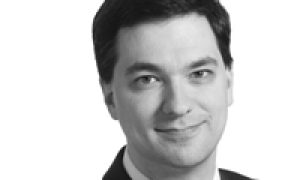Wednesday's Democratic presidential debate between Sens. Hillary Clinton and Barack Obama featured pointed barbs, exchanges and one-liners. What it lacked was accurate and articulate statements on the economy.
Clinton: "[W]e now have the largest budget deficit we've ever had, $311 billion. We went from a $5.6 trillion projected surplus to what we have today, which is a $9 trillion debt."
This is wrong on several counts. By calling the current budget deficit the largest in American history, Sen. Clinton absurdly fails to adjust for any economic growth - or even inflation - over the nation's 232-year history. Such analysis would not pass freshman economics. Using standard measurements, this year's projected budget deficit of 3 percent of the economy is a far cry from the actual record 30 percent level in 1943 during World War II.
And even using her unadjusted numbers, Clinton's mid-year figure has not yet passed the final 2004 budget deficit of $413 billion.
Additionally, Clinton accuses the Bush administration of turning the $5.6 trillion 10-year surplus that was projected on paper in 2001 (and therefore never actually existed) into a $9 trillion debt. But the latter figure represents the total cumulative federal debt that has been building since the early days of the Republic. By linking those figures, Clinton effectively blames the current administration for budget policies dating back to the 1803 Louisiana Purchase.
Obama (After the moderator suggested that capital gains tax hikes would reduce revenues): "I would look at raising the capital gains tax for purposes of fairness."
This was the most astonishing statement of the debate. It's one thing to advocate large tax increases in order to fund priority spending. Yet after tacitly acknowledging that capital gains tax hikes would likely reduce tax revenues, Sen. Obama was not deterred. He would nearly double these tax rates for the stated purpose of reducing the income of investors -- even if it harms the economy and fails to produce a dollar of new tax revenues.
If this tax hike caused capital gains revenues to fall, would Obama actually reduce priority spending to "pay for" this tax increase? How many federal programs would he sacrifice towards the goal of reducing investor incomes?
Clinton: "That's why I'm in favor of much more college aid, not these outrageous predatory student loan rates that are charging people I've met, across Pennsylvania, 20, 25, 28 percent interest rates."
This claim is simply implausible. The vast majority of student loans are provided or guaranteed by the Department of Education, with interest rates well under 10 percent. In fact, President Bush recently signed another student loan expansion dropping the interest rate on the most popular student loan program from 6.8 percent in the current school year to 3.4 percent by 2011. There has been only one reported example of a 28 percent interest rate, and even that was calculated using non-traditional accounting methods. This does not justify giving voters the false impression that typical college students are paying 28 percent interest rates.
Obama: "What I have proposed is that we raise the cap on the payroll tax, because right now millionaires and billionaires don't have to pay beyond $97,000 a year … [which] only 6 percent of the population does."
Yes, only 6 percent of households will earn more than $97,000 this year. But many more would pass the income threshold for this tax increase at some point in their working careers. Glenn Hubbard, former chairman of the President's Council of Economic Advisors, has noted that more than one-quarter of Americans move into a higher tax bracket each decade. Most workers' incomes start low and then move up during their careers, before falling back at retirement. Many more than 6 percent of households would face this tax increase over the years.
Under Obama's proposal, these families would face a staggering 12.4 percentage point tax increase on all incomes over the threshold. This dwarfs the 4.6 percentage point tax cut that upper-income families received in the 2001 and 2003 tax cuts (which he would also repeal), Combined with the near-doubling of investment taxes, Obama's policies may amount to the largest tax increase in American history -- all to fund new spending, rather than deficit reduction.
Brian Riedl is the Grover M. Hermann fellow in federal budgetary affairs in the Roe Institute for Economic Policy Studies at The Heritage Foundation (heritage.org).
First appeared in The New York Post
